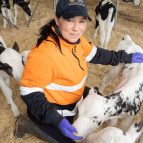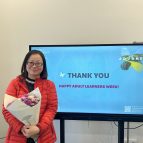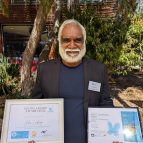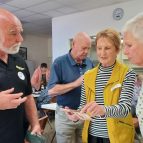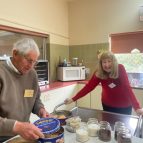Power through power tools
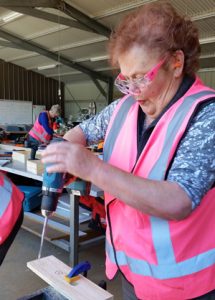
A Women’s Shed that teaches women trades skills is flourishing in Orange, New South Wales.
In the large shed just out of Orange, women of all ages work away at benches in their hot pink safety vests, hammering and sawing, exchanging advice and encouragement. Whether they’re making a bird feeder or a tool caddy, most of the women are learning trade skills and tool handling skills for the first time.
One of them is Carmel Hanrahan, 72. Before her husband David died four years ago, Carmel says she was the kind of person you’d find curled up in a chair with a good book while her husband did the kind of handyman jobs that kept their old house maintained and running smoothly. These days Carmel can wield a saw and screwdriver along with the best of them. She’s one of around 30 women who regularly turn up for practical hands-on sessions at one of Australia’s first trade skills sheds for women.
‘It’s made me much more assertive. I know if I’m dealing with a tradesman to say ‘timber’ instead of ‘wood’. If you have the vocabulary that let’s them know you know what you are talking about. It’s so important for women to know how to do this,’ Carmel Hanrahan.
The idea started as a project of Orange City Council ‘Choices at Home’ project for older residents, people with a disability and carers as a way to develop independent living skills.
Paula Beattie, support worker for ‘Choices at Home’ says, ‘My colleague Fiona Cooper and I had the idea of a tinker shed for older women a few years ago. Most of the older ladies we worked with had traditionally been homemakers so when their husband died or went into care they were faced with how to maintain the house and they were worried about being ripped off by tradesmen. The idea was to teach women the vocabulary and the language so they can talk confidently to tradesmen, as well as how to do basic handy work themselves.’
‘We invited the Supporting and Linking Tradeswomen (SALT) project to come up and give a woodworking workshop. They’ve been awesome. Quite a few local women came along and everyone really enjoyed it.’ The idea took off from there.
Word soon spread and the idea of a Women’s Shed proved so popular that it’s been opened up to all women of all ages. Today the Shed has around 50 members aged from 30 to 80. ‘I’m taking more and more calls about the Shed every week,’ Paula says.
Orange Mayor John Davis OAM said the initiative had made significant impacts on the lives of women across the region.
‘I measure success in terms of the interaction between women, the friendships they take outside the workshop and into their homes and community. Having a social support network really affects people’s health, welfare, mental health and wellbeing,’ Paula Beattie, Orange Council
‘It is aimed at women who haven’t had the opportunity to learn how to do basic home improvements. But of course, it’s much more than that,’ Cr Davis said. ‘When women get together and work on projects, they’re also talking together, building relationships, being there to support each other.
‘When tough times come around, say, for women who have lost a partner, it is a great opportunity to make sure they have a social outlet and they can talk with other people in the same boat.’
Apart from the support of Council, Bunnings offered the women DIY sessions and the local men’s shed donated tools. In February 2016, the Shed achieved a milestone when Wangarang Industries, which offers jobs and training for people with disabilities, offered the women their own space. Kevin McGuire, general manager says, ‘We had two sheds out the back that were underused and one of the board members mentioned a Women’s Shed had started up and I said, “Wow, sensational, who do I contact?”
Wangarang auspices the Shed, providing insurance and ensuring all the women have inductions to comply with health and safety regulations. ‘It’s a wonderful opportunity for our disabled ladies to participate and conversely it’s a great opportunity for the other women in the Shed to be exposed to and work alongside women with disabilities, it’s a great learning experience for them as well. I see it as a win–win situation.
‘So they’ve learned how to fix sticking doors, mend flyscreens, reset fuses in a fusebox, all these wonderful practical skills. But they’ve also learned a lot from each other,’ Kevin says.
Carmel
‘I’d call myself an academic rather than someone handy. But since I’ve been on my own I have had to step up to the mark. It’s very empowering,’ Carmel, 72 says.
‘This is an old house and there are always things that need doing. For example, I have an electrical board that used copper wire so I learnt it’s easier and safer for me to have circuit breakers so now I feel safer in my own home.
‘After my husband died I took my car in for a service and I was ripped off. The girls at the Shed have given me the name of a lovely man and I feel confident he will do the right thing by me. But I’d like to be able to tell the person fixing my car what’s wrong with it. If you can do that you’re treated differently.
‘We went up to Beaurepaires to learn how to maintain the tyres on our cars. That’s something your husband always did for you. All these little things make a difference.
‘We all want to stay in our homes and this is a way to develop our independence so we can do that. So I feel empowered and I feel safer.
‘With the Shed I found an atmosphere of caring and sharing. Having had cancer I can’t use one arm so well. So if my arm gets too tired to keep sanding you’ve got these beautiful young ladies like Michelle to help you out. It’s such an amazing thing.
‘The Women’s Shed is about total equality. It’s open to all women, all kinds. We have women with disabilities, single mums, academics, older, younger, married and people whose husbands have died. There’s so much diversity. It’s wonderful.
‘The ladies from SALT came up and gave us basic toolkits and told us about what they do in communities. They went out to Lightning Ridge to help farming people affected by the drought, doing maintenance jobs and teaching women how to use tools. That really inspired me. It’s amazing when you see what we can achieve together. My dream is that we hook up a trailer onto a car, and load all our tools and set up a roster where we go out and help people with maintenance jobs and their gardens.
‘The shed where everyone is helping each other feels like a small community in itself. We have amazing leaders in Paula and Fiona. They have great ideas and are always so encouraging. With the recent bushfires in our area, they asked us to put our heads together to see how we could help a family with primary school aged children. And we came up with some great ideas.
‘They are terrific at connecting us with the broader community. So we are not just helping each other inside the Shed. It goes both ways. We can do things for the wider community and they give back. For example, we donate the fruit and vegetables we grow in our raised garden beds to local charity Foodcare who distribute it to people who are struggling on low incomes. Bunnings really helped us along with DIY workshops and Wangarang gave us a home. It’s wonderful.
Michelle
As a girl Michelle Einsaar spent her school holidays working with her dad. ‘It was either hang around home not doing much or get out with him on the tools and help. He did all sorts of jobs like painting, installing antennas, putting up sheds.’
‘With men’s sheds, they already have the practical skills and are getting together for the social interaction. But we’re learning new skills, learning to be independent. It’s transformative,’ Carmel Hanrahan.
But it wasn’t until she was in her mid 30s and at home with a new baby that Michelle took up the tools again. She saw a stand at an International Women’s Day celebration and met Heather Cooper who was promoting the Orange Women’s Shed. ‘I thought, men have all the fun going to their shed. I’d love to do that.’ She put herself on the mailing list and things snowballed from there.
With her practical skills and qualifications as a high school teacher Michelle is one of the Shed’s unofficial trainers, drawing up plans for projects and teaching women the skills needed to get them done. ‘The Shed isn’t so much about learning skills for me so much as passing on what I know.’
‘I’m working out what job I might try for when my son goes to school. Maybe something involving woodwork and teaching. I’m a single mum and I’m trying to work out my next steps.’
‘I feel a real sense of accomplishment, I enjoy the socialising and the conversation which is a nice change from talking to a 3 year old. It’s a great way of putting my skills into practice. And it’s also a great way to make new friends. Most of the women are seniors so they have so much life experience.’
‘They make choices about what speed they want to go at. There are no deadlines. Some work on a project for 2–3 weeks, others do it all in one go. It depends on their skill level. Some work on their own, others stand around a bench and go step by step.
‘It’s made me a better teacher. Teaching kids I often felt like I was shovelling information at them and it was hard to tell if you were getting through, I didn’t get feedback. With the ladies they are always asking questions, giving you feedback, “You’re doing a good job, thank you.” They are always complimenting me. So it’s reassuring and I really enjoy it.’
Hands on excursions are great for confidence building. ‘We go up to Bunnings and walk the aisles looking at things and discussing what’s on the shelves. The women might say, “Is that what that’s for?”
For some women handling tools is a complete novelty. ‘For a lot of these ladies of a particular generation or from particular cultural backgrounds the shed was taboo – it was the man’s space. They’ve been told not to touch the tools, or use them or even know the names of different tools. Then their husband dies and they have a shed full of tools that they don’t know what to do with and that they don’t know the names of.
‘Some of the women have had to learn how to hold a saw, or use a drill but now they’ve learned how to do things like fix a hinge or change a tap washer. They don’t have to call a handyperson or a tradie, most of whom are male, to come and do things for them. They don’t have to pay someone to do a job they have learned to do themselves.
‘So it’s very liberating for the ladies to be able to say, “I’ve got tools, I’ve got a toolbox, I can use a drill … I can do this job myself.
See the full issue of Quest 1, 2017

